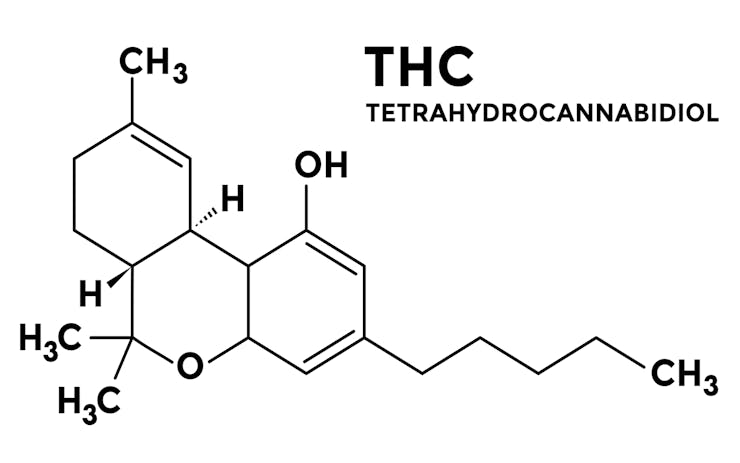THC, short for tetrahydrocannabinol, refers to the primary chemical compound responsible for cannabis’ euphoric effects. THC is a cannabinoid, which are compounds produced by the cannabis plant that bind uniquely to receptors in the body called endocannabinoid receptors. A majority of cannabis varieties are THC-dominant, meaning THC is the most abundant cannabinoid. THC-dominant cannabis typically contains anywhere from 10% to 30% THC. Although many factors contribute to the potency of cannabis, generally a higher THC percentage correlates with a more intense high.
“OG Kush is a high-THC strain that will make you feel euphoric, relaxed, and giggly.”
“I’m looking for a cannabis strain with no THC because I don’t like feeling high.”
What is THC?
THC, or tetrahydrocannabinol, is the most well-known compound in cannabis due its euphoric effects. In other words, THC is one of the main reasons we feel high after using cannabis. THC is a cannabinoid, which refers to a class of unique compounds in cannabis that interact with the body. THC can provide a range of different feelings, from desirable relaxation to the less-than-pleasant sensations like anxiety and paranoia. If you are more sensitive to the effects of THC, try lowering your dose; often, challenging experiences with cannabis are a result of too much THC.
While THC is the most well-known cannabinoid in cannabis, there are dozens of others including CBD, CBN, and THCV. However, most other cannabinoids produced by the plant are usually found in trace amounts.
Benefits of THC
Although THC is often regarded as being merely recreational, it may actually provide an array of medical benefits, including relief of nausea and vomiting, insomnia, appetite loss, and inflammation. High-THC cannabis strains and products are popular among individuals treating cancer, glaucoma, sleep issues, gastrointestinal conditions, PTSD, migraines, autoimmune disorders and chronic illness, neurodegenerative conditions, and more.
The relaxing, uplifting benefits of cannabis should not be written off, either. Many medical patients, especially those with debilitating illness and conditions, may find psychological relief while enjoying cannabis, particularly with symptoms of anxiety and depression.
What are the effects of THC?
In addition to the medical benefits above, THC can provide a range of different effects and sensations. It may also come with some uncomfortable side effects. It’s important to note that THC’s effects may be shaped by the presence of other compounds in the plant, such as other cannabinoids and terpenes. Many consumers prefer products that contain a variety of compounds from the plant, as isolated THC is associated with increased anxiety in some individuals.
High-THC cannabis strains and products may deliver one or many of the following common effects:
- Euphoria or elation
- Relaxation
- Increased appetite
- Sleepiness/drowsiness
- Creativity
- Laughter
- Dizziness
- Anxiety and paranoia
- Temporary memory impairments
- Increases in heart rate
- Dry mouth
- Red eyes
This list is by no means exhaustive. The subjective effects of THC can vary widely based on your unique biology, history of use and tolerance, dose, environment, and mood.
